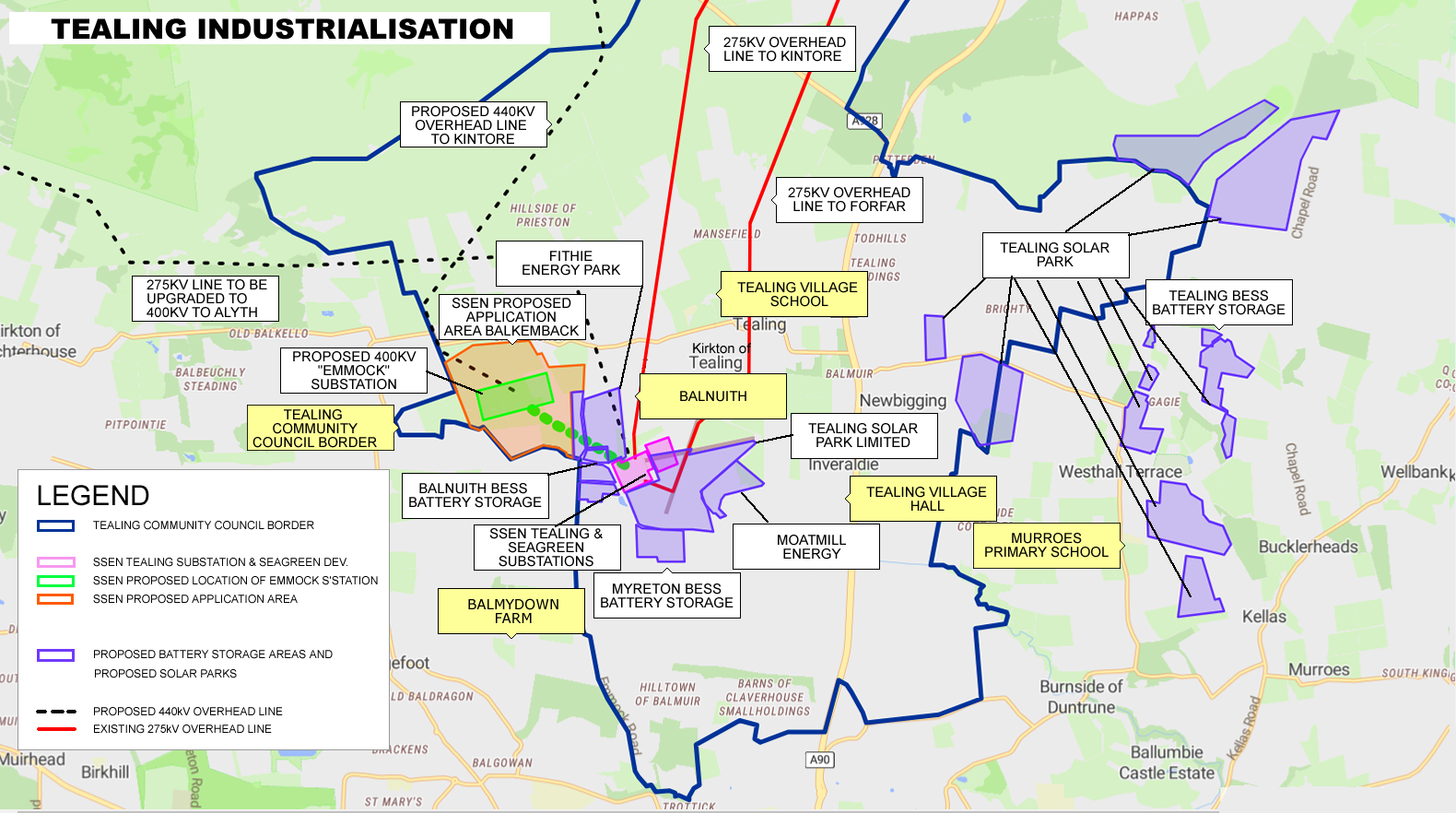Battery Energy Storage Systems
What are battery energy storage systems?
Battery Storage Systems (BESS) are most commonly lithium ion batteries and associated electronics housed in shipping containers. They store energy to be discharged at times of need. Currently private individuals lease land to energy companies for around 40yrs to allow their land to be used, and they can make a lot of money for this £1500 per MW/year, with a £10,000 signing bonus.
These energy companies buy electricity when it is cheap and store it in the batteries and then release it when the cost of electricity is high, therefore making profit. This generally correlates with surplus electricity from renewables such as wind and solar. These are not government lead projects, they are private individuals and companies who stand to make a lot of money, at the expense of those who live next to them.
The Scottish Government is aggressively promoting the development of Battery Energy Storage Systems (BESS) as part of its NetZero strategy. Across Scotland, hundreds of BESS projects are in the planning and development stages, with more being proposed every month.
Here in Tealing, four large-scale BESS projects are in the pipeline, with a combined storage capacity exceeding 4 GWh. If approved, our small village will become home to one of the largest battery storage sites in the world.
Government Contradictions: NetZero vs. Nature
While the government pushes for rapid industrial energy expansion, it also claims to prioritize environmental restoration. In December 2022, the Scottish Government published “Tackling the Nature Emergency – Scottish Biodiversity Strategy to 2045,” which highlights the urgent need to restore ecosystems, improve biodiversity, and protect Scotland’s green spaces.
Yet, despite these commitments, they continue to approve large-scale industrial projects that flatten natural landscapes, replacing them with energy infrastructure rather than restoring biodiversity. This contradiction raises serious questions:
- How can Scotland tackle the nature emergency while destroying green spaces?
- Why are rural communities like Tealing being sacrificed for industrial expansion instead of being supported in rewilding efforts?
- Is there a balanced approach that prioritizes both renewable energy and biodiversity conservation?
Scotland’s Biodiversity Crisis
While energy projects push ahead, Scotland remains one of the worst-ranked countries in Europe for biodiversity.
Key Facts:
- Low Biodiversity Intactness Index (BII) – Scotland’s BII is just 56%, meaning nearly half of its original biodiversity has been lost.
- Global Ranking – Scotland is in the bottom 25% of countries worldwide for biodiversity health.
- Long-term Decline – Centuries of deforestation, land use change, and industrialization have stripped Scotland of much of its natural wilderness, forests, and diverse habitats.
Instead of prioritizing land restoration and habitat conservation, the government is turning rural areas into industrial zones. BESS alone will not solve Scotland’s energy transition challenges if it comes at the cost of nature.
The Motivation Behind BESS: Profit Over the Planet
The driving force behind the development of BESS is not environmental concern but profit. Developers are motivated by the financial gains that large-scale industrial energy projects can bring, not by a commitment to protecting the environment. The push for BESS is, at its core, about securing lucrative contracts and access to land, with little regard for the long-term environmental costs. For developers, it’s about money—nothing more.
The Impact of Agricultural Changes on Scotland’s Countryside
Around 70% of Scotland is solely or partially managed for agriculture—10% arable, 20% pasture, with the rest used for rough grazing, often tied to grouse moors and red deer estates. However, profound changes in farming over the last century have significantly altered Scotland’s biodiversity and landscape.
- Mechanisation & Habitat Loss – The move from horses to machines eliminated stock ponds, valuable habitats for plants and wildlife. The consolidation of farms led to larger, less diverse fields.
- Soil & Water Quality Decline – Increased ploughing, chemical fertilisers, and livestock numbers have harmed soil health, water quality, and carbon storage, contributing to greenhouse gas emissions.
- Wildlife Decline – The loss of non-cropped habitats has caused major reductions in birds, pollinators, and grasslands:
- Greenfinch, kestrel, and lapwing populations have dropped by over 50% since 1994.
- Oystercatcher and rook populations have declined by 25-50%.
- Lowland meadows have decreased by 39%.
A Better Approach: Supporting Farmers, Not Concrete Fields
Despite these challenges, many farmers are working to restore biodiversity—planting hedgerows, protecting ponds, and reintroducing wildflower margins. The government should be supporting farmers in these efforts rather than prioritizing industrial energy projects that pave over farmland.
Instead of converting arable land into battery storage sites, the government should:
- Support farmers in sustainable agriculture—balancing food production with biodiversity restoration.
- Protect agricultural land from industrial development—keeping rural communities rural.
- Invest in habitat restoration alongside energy projects, ensuring that NetZero does not come at the cost of nature.
The Future of Tealing
As more BESS projects are proposed, we must ask: Are these developments being placed responsibly? Are they prioritizing people and nature—or simply turning rural communities into industrial zones?
Stay informed, get involved, and let’s work together to ensure that Scotland’s energy transition benefits both the climate and the environment.
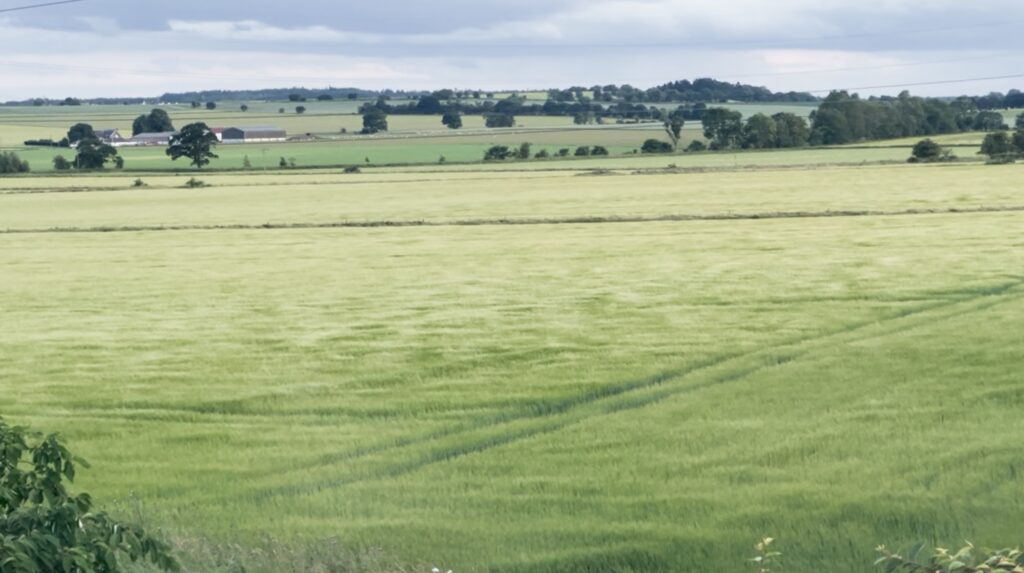
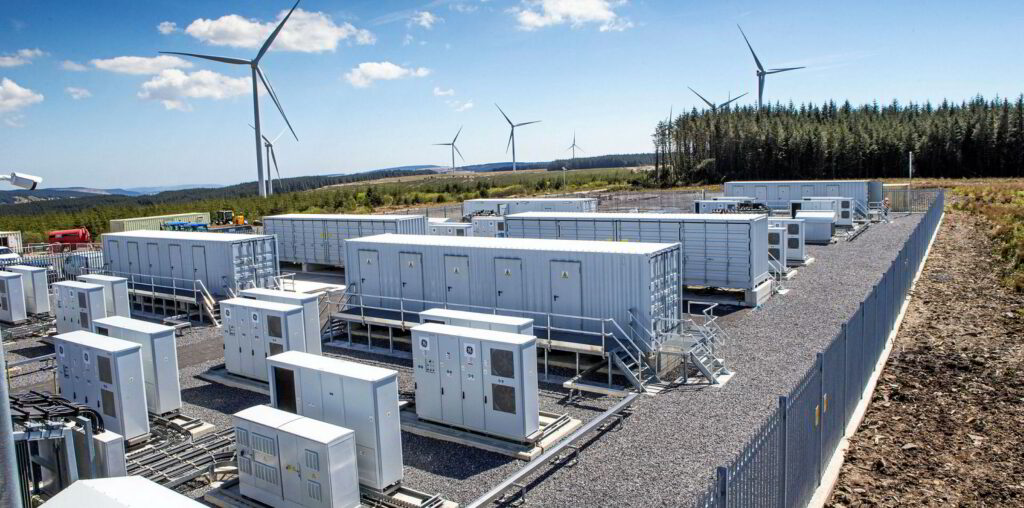
Why are we objecting to this?
Fire Risk and Risk to people, animals, property and the Environment.
Since 2011, 63 major energy storage failure events have been documented worldwide, many resulting in severe, life-altering injuries. (See links here and here.)
A proposed 560-battery BESS in Tealing would have an explosive force equivalent to 1,500 tonnes of TNT, with numerous homes sitting less than 100m away. (See image—dwellings marked in red.) Given an estimated 0.1% failure rate per battery per year, this facility could experience 22.4 failures over its 40-year lifespan.
Lithium battery fires are extremely difficult to extinguish, and in many cases, firefighters have no choice but to let them burn out—such as in the recent Moss Landing incident. Extinguishing a battery fire can require millions of litres of water, far exceeding standard fire service recommendations of 2,000 L/min for 2 hours. Real-world cases, like those in Australia, have required days of continuous firefighting.
Beyond the immediate fire hazard, these incidents release toxic smoke into the air and can contaminate local groundwater. Among the dangerous chemicals produced is hydrogen fluoride, a highly toxic gas that can be lethal even in small concentrations.
Read here about the BESS fire in Liverpool and the recommendations from the fire brigade such as blast walls!
Most recently, on January 16, 2025, a massive fire broke out at the world’s largest BESS in Moss Landing, California—the second fire since it became operational just four years ago. Firefighters were forced to adopt a “monitor and contain” strategy, allowing the fire to burn itself out. 1,500 residents had to be evacuated. (Read more here).
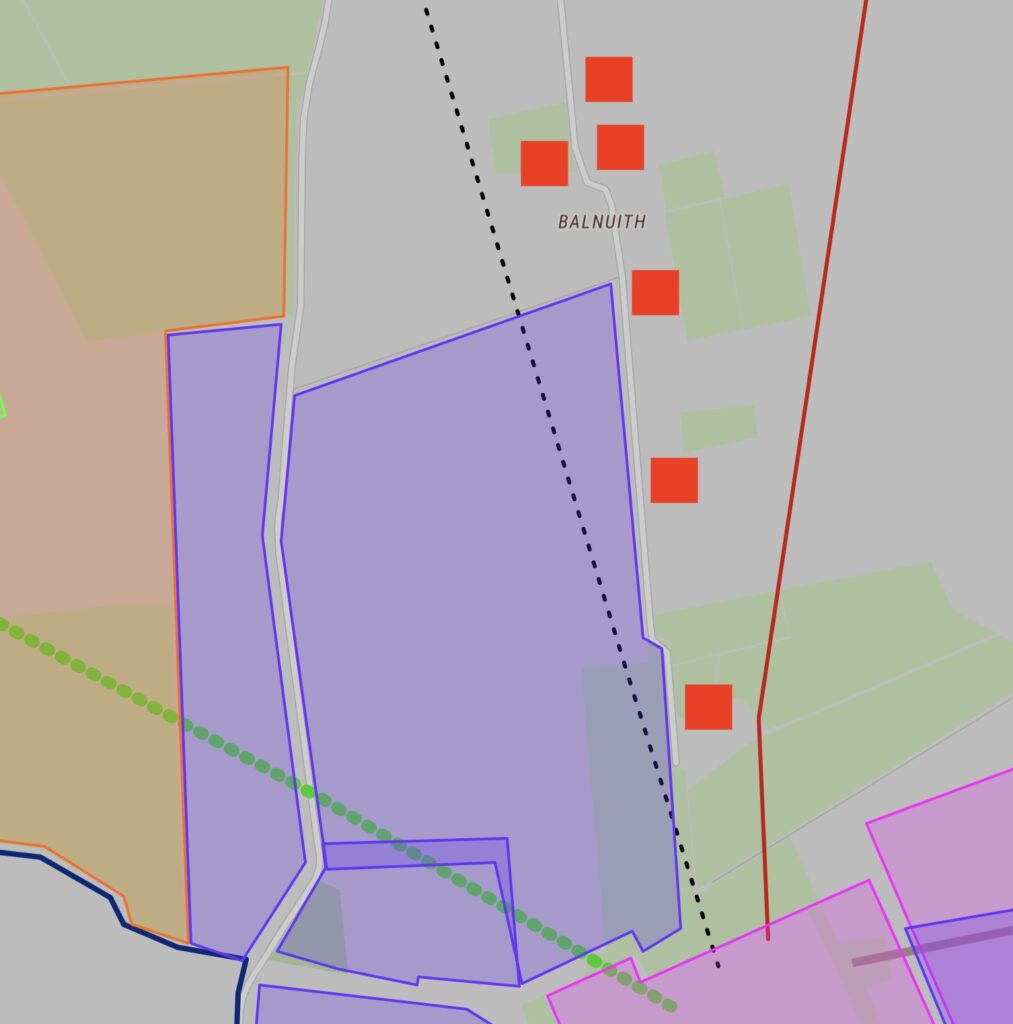
Noise Pollution
Noise is an important public health issue. It has negative impacts on human health and well-being and is a growing concern. The WHO Regional Office for Europe has developed these guidelines, based on the growing understanding of these health impacts of exposure to environmental noise.
BESS are notoriously noisy! This is because they require cooling mechanisms for the battery container/cubes, inverters, the LV to MV transformers and the primary transformer. Cumulatively the average noise emitted by a 5MWh container is 75dB. Some sources state a noise emission of 70-95 dB measured 1m from the unit. A BESS facility comprising of several hundred battery units can easily produce noise levels over 70 decibels at residences located 100 ft from the site (BESS noise monitoring). Even with noise mitigating measures Fithie BESS will likely exceed the acceptable noise levels.
The level by which the rating level exceeds the prevailing background sound level indicates the following potential impacts as specified in BS4142: (1) A difference of 10dB is likely to have a significant adverse effect. (2) 5dB is likely to have an adverse effect. In Balnuith the background level of noise is very quiet 27dB as measured by Banks Energy. We will perform our own assessment, but we believe that 650 Air conditioning units up wind, and in close proximity to dwellings will have a significant adverse effect.
Click here and here to hear for yourself how noisy BESS are!
Flood Risk
The Fithie Burn floods regularly, in fact in 2023 on 3 separate occasions the road was not passable due to water. The purple on the SEPA flood map to the right shows high surface flood risk, the blue shows high risk river flooding. The red box is the proposed BESS site. Converting more farmland to concrete will increase the surface run off and increase the flood risk. This will impact those who live here and potentially even the existing Tealing substation (shown in yellow).


Cumulative Impact
Tealing is a picturesque rural village, but since construction began on the extension of the existing Tealing substation in 2021, we’ve endured years of noise and disruption. The screening trees were removed, leaving residents to face substation infrastructure instead of the peaceful countryside we once enjoyed. Now, SSEN have submitted a planning application for a 400kV substation—which will be 50% larger than both the existing and new substations combined. The cumulative impact of this industrialisation threatens to transform the charming village that many of us proudly call home.
The map to the left shows all the current and proposed planning applications, marked in green, pink, and purple. The red markers indicate the homes that could soon be surrounded by industrial development, bringing with it negative consequences for both quality of life and house prices.
Loss of Agricultural Land
This is prime agricultural land as identified by the Scottish Government (class 3.1) (click here).
Food production is important. If we don’t produce our own food we will need to import it. Lincolnshire council has recently rejected plans for a 43 hectare solar farm on those ground, will our council be equally sensible? BBC article regarding this can be found here.
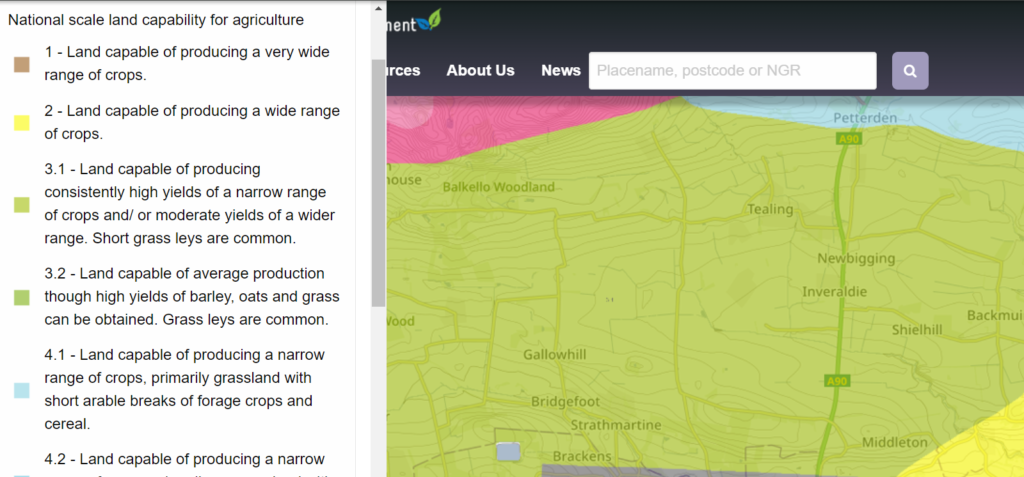
Lack of Transparency
There has been no communication to local residents regarding multiple planning applications. We have found out about the proposed developments by searching the ECU website or coincidentally through friends, even when local property addresses are named on the actual application itself. This is deception. We are not being given time to prepare and to counter these multiple applications. We ask that Angus Council and the ECU/ Scottish Ministers reject these applications and consider the impact on the local population.
List of proposed Battery Sites
| Site Name | MegaWatts / Number of Batteries | URL to site |
|---|---|---|
| Myreton BESS | 650 MW / 450 Batteries | Link |
| Balnuith BESS – consented | 100 MW / 50 Batteries | Link |
| 17 acres battery storage | 100 MW / 50 Batteries (?) | Link |
| Fithie Energy Park | 1400 MW / 560 Batteries | Link |

